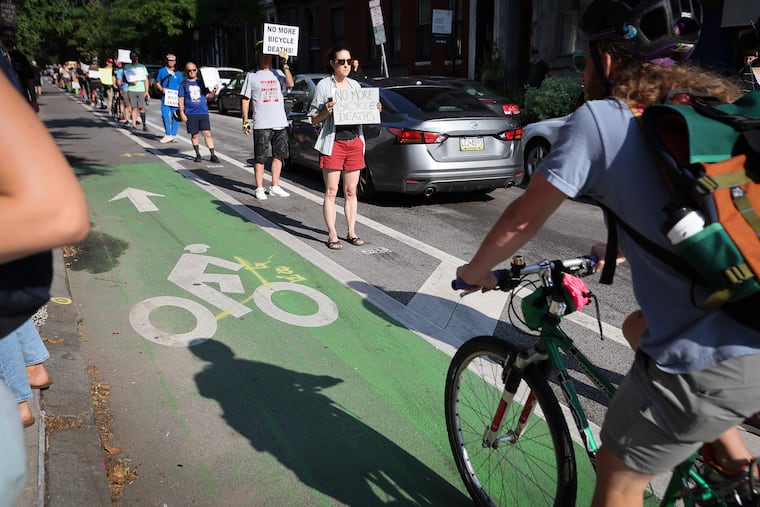Philadelphia looks to ban drivers from stopping cars in bike lanes following high-profile deaths
The legislation also increases the penalties for stopping or parking in a bike lane.

Philadelphia lawmakers are looking to ban people from stopping their cars in city bike lanes and increase penalties for doing so following a spate of high-profile deaths of cyclists hit by drivers.
Cycling advocates erupted into applause Thursday when Council President Kenyatta Johnson and Councilmember Jamie Gauthier introduced the legislation. While drivers are already not allowed to park in city bike lanes, the new bill would make it illegal for drivers to pull over or stop in the lanes at all.
The legislation also increases the penalties for stopping or parking in a bike lane. Currently, drivers can face a fine of $75 in Center City and University City and a $50 fine for doing so elsewhere. The bill would increase the penalties to $125 in Center City and University City and $75 in the rest of the city.
“When you park in the lane, it causes the bicyclists to go out into the traffic. There lies the vulnerability of a person actually getting hit,” Johnson said. “You may jump out of your car and go into the store and come back out and somebody could actually be dead or severely injured.”
The legislation is supported by the Bicycle Coalition of Greater Philadelphia, the most prominent cycling advocacy group in the city. Executive director Chris Gale on Thursday urged Council to increase funding for infrastructure that physically separates cyclists from drivers. He said city policies can prevent traffic deaths, saying 130 people were killed on Philadelphia roads last year.
“These are real people with families and friends who will forever have an empty seat at the table,” he said.
» READ MORE: Mayor Parker tells cycling activists the city has plans to make bike lanes safer
Johnson’s support of the bill is significant — he has been a frequent target of traffic-safety groups who took issue with his opposition to traffic-calming measures on Washington Avenue in his South Philadelphia district.
Council will consider the legislation this fall and a committee will hold a public hearing on the matter.
Cycling organizations have long lobbied lawmakers to improve safety in the bike lanes, and their calls intensified this summer after Barbara Friedes, 30, was killed while riding in a bike lane on the 1800 block of Spruce Street. Authorities charged Michael Vahey, 68, with homicide by vehicle and allege he was intoxicated when he swerved into the bike lane and struck Friedes.
» READ MORE: NHL star and South Jersey native Johnny Gaudreau and brother killed after being struck by vehicle while riding bikes
Johnson’s legislation comes a week after Mayor Cherelle L. Parker held an event to publicly assure cycling advocates that the city will explore protecting bike lanes with concrete barriers, a key demand of traffic-safety groups.
Cole Friedes, Barbara Freides’ husband, provided written testimony to Council on Thursday in favor of funding such barriers, saying the number of people killed in traffic incidents are “more than just statistics.”
“They represent lives shattered, families devastated, and a city that is failing to keep residents safe,” he said.
Johnson said the city is looking into alternative revenue streams — such as state or federal funding — to pay for concrete infrastructure that is “significantly expensive.” He described his bill Thursday as just one step in improving safety for cyclists.
“I want to be supportive of the bicycle community,” he said. “We wanted to make sure that they know that we see them, we support them, and we’re going to work in partnership with the administration to continue making sure the city of Philadelphia is a safe city for those who ride bicycles.”